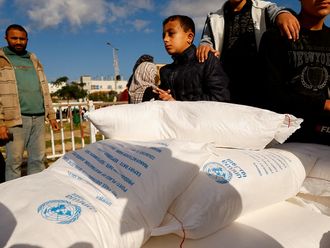Pakistan’s ongoing stand-off with the US over the latter’s refusal to subsidise a batch of eight new F-16 fighter planes brings back uncomfortable memories. For the Pakistani public, Washington remains an unreliable ally.
In 1990, the US blocked sales of new F-16 fighter planes on the grounds that Pakistan was making progress towards producing nuclear weapons. In time, the move became controversial as Pakistan simply turned towards its old friend China and ended up producing a home-built fighter plane, the JF-17 Thunder.
More importantly, in strategic terms, Pakistan became a nuclear power just eight years later when it carried out its first nuclear tests in 1998 in response to a series of nuclear tests by India. Even though the US at the time sought to restrain Pakistan from adopting the nuclear route, Washington’s ability was found to be limited. With US sanctions in place, the US was left with few tools to usefully apply on the ruling structure in Islamabad.
This time around, the US is not refusing to sell the F-16 fighters to Pakistan. It has simply tied the subsidy it had earlier agreed to Pakistan, taking action on three fronts; notably, progress towards battling Afghanistan’s Haqqani network, facilitating the release of Shakil Afridi, a Pakistani doctor arrested in 2011 for facilitating the US attack that killed Osama Bin Laden, and possibly concerns over the advancement of Pakistan’s nuclear programme.
Issues such as the case of Dr Afridi clearly fly in the face of reason. The US has itself been faced with situations where individuals caught on its turf spying for foreign governments were promptly prosecuted and sentenced, notably Jonathan Pollard, an American intelligence analyst who was caught spying for Israel.
Absurdly, making this issue a pre-condition for future assistance and, for that matter, publicising it has placed Pakistan in a clear bind. It is now impossible for any Pakistani decision-maker — civil or military, to accept this condition and face public humiliation for conceding under pressure from a foreign government.
On other matters too, notably the case of tackling the Haqqani network, Pakistan at best cannot be held entirely responsible for events on foreign soil. But, if indeed, Pakistan has not taken actions that it could have to tackle this issue, US pressure should have best been applied discreetly and in private.
Meanwhile, Washington’s own history in Afghanistan is worth recalling. Tens of thousands of American troops, backed by the most expensive war in history, failed to curb an insurgency that continues to flourish to this day. Holding Pakistan accountable now for a conflict heading southwards flies not only in the face of reason but also fair play.
Ill-advised action
And finally, if indeed the advancement of Pakistan’s nuclear assets partly provoked the US response, Washington’s action is clearly ill-advised. Pakistan lives in a volatile region with a nuclear-armed neighbour — India.
The decision to manufacture nuclear weapons was more a reflection of Pakistan’s security challenges than any other factor. For opponents of assistance to Pakistan, the history of nuclearised countries is worth recalling. To this day, there isn’t a single country with a successful nuclear programme that has agreed to dismantle its arsenal and Pakistan can not be expected to behave differently.
Meanwhile, withholding the subsidy for the F-16s — valued at approximately $430 million (Dh1.57 billion) — clearly ignored the importance of working to nurture an otherwise vital relationship. For the US, Pakistan has remained an indispensable ally since the 1980s when Washington backed the ‘mujahideen’ resistance fighters in Afghanistan against forces from the former Soviet Union.
More recently, action by Pakistan’s army and the air force has helped the US maintain military pressure on the Taliban within Pakistan’s borders. This followed the US-led invasion of Afghanistan and the elimination of its Taliban regime after the 2001 terrorist attacks in New York known as 9/11. The US campaign relied heavily on Pakistan’s support, including intelligence support and logistics.
Going forward, Afghanistan will indeed remain a trouble spot not just for itself but the surrounding region too. The thought of a fragmented state, where non-governmental militant groups hold sway on portions of its territory, must be disconcerting for any knowledgeable observer. Afghanistan indeed remains the country from where Osama Bin Laden planned the 9/11 attacks.
Today, the threat of Daesh (the self-proclaimed Islamic State of Iraq and the Levant) making advances in Afghanistan presents an acute challenge for the country itself and the surrounding region.
Going forward, in spite of the best efforts by the US, Pakistan and other key foreign players, Afghanistan will likely remain a trouble spot for the foreseeable future. A large-scale protest this month — by ethnic Hazara tribesmen over a planned route for an ambitious new electricity project — provided a glimpse of internal divisions fuelling Afghanistan’s discord in years to come, in addition to the militancy-related challenge.
Such trends make it clear that Pakistan will need to remain a part of any regional security arrangement to stabilise Afghanistan. Within itself, Pakistan’s stability remains of global interest, especially given that the country has emerged as the Islamic world’s only state armed with nuclear weapons.
For the US, as before, it appears that spoiling the relationship with Pakistan is easier than rebuilding it. American officials in the past have clearly been baffled by continued anti-US trends on the streets of Pakistan in spite of periods of generous military and economic assistance.
It would be worthwhile for US decision makers to ask themselves if indeed they can realistically expect the popular mood to swing in their favour on the streets of Pakistan, where many are convinced that America remains an unreliable partner.
Farhan Bokhari is a Pakistan-based commentator who writes on political, security and economic affairs.











